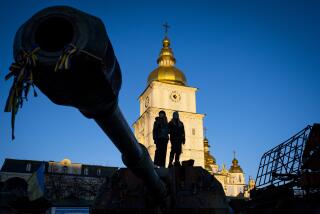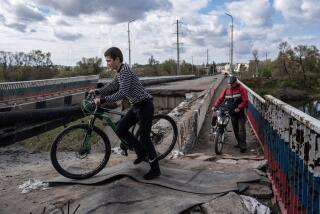Ethnic Discord : Mostar’s ‘Rubble Man’ Tries to Unify Torn City : ‘If you run away, then you’re accepting blackmail,’ says a determined Hans Koschnick, who helped rebuild Germany after World War II.
MOSTAR, Bosnia-Herzegovina — Newspapers at home call him the “Rubble Man,” a play on the 50-year-old German term for the anonymous legions who emerged from bomb shelters at the end of World War II to clear away the foot-high remains of urban Germany.
Now it is Bosnia’s turn to be shelled to rubble, and Hans Koschnick, a 66-year-old politician from the city-state of Bremen, has moved into Mostar, Bosnia’s second-largest city, in hopes of applying some of the rebuilding lessons that he learned as a young man in postwar Germany.
Koschnick, who served as mayor of Bremen for 18 years, is nine months into a two-year hitch in Mostar as the European Union’s administrator for this ruined city--a kind of unelected mayor.
The European Union sent him here not only to rebuild the city’s devastated buildings, streets and bridges but also to try to repair relations between its Croatian and Muslim residents, who battled each other for nearly a year in some of the most savage fighting of Bosnia’s 3-year-old, many-fronted civil war.
Installed in a hotel in the heart of divided Mostar, Koschnick functions as a highly visible element of the international effort to bring peace to this country. Here, as elsewhere in this former Yugoslav republic, hostile Muslims and Croats have been shoved by the international community into an uneasy--and, many say, a wholly unnatural--alliance to fight their mutual enemy: the Bosnian Serbs.
The Bosnian Serbs are better armed than the country’s Muslims or Croats, and they have seized 72% of the country’s territory. It is hoped in Washington, though, that if the Muslims and Croats can be made to stop fighting, form a working federation and cooperate on the battlefield, they can achieve a string of military victories that could bring the Serbs to the negotiating table. And there, perhaps, the warring groups could work out an arrangement for Bosnia that would be bearable for all.
This is a very long shot. The Croats and Muslims signed instruments of federation a little more than a year ago, but across Bosnia evidence of their willingness to implement the agreement has been sporadic. Croats have provided artillery support for the Muslim government forces in offensives against the Serbs this spring, but the federation “partners” have been unable to agree even on a place where they can come together and draft a working constitution. Mostar, among Bosnia’s most heavily damaged cities, represents a key test of whether Bosnia’s Muslims and Croats will ever be able to build a nation together.
“Mostar is the model,” said Koschnick, who speaks in rapid-fire, thickly accented English. “If the city benefits from our presence here, then we will know that it’s possible to have a functioning (Muslim-Croat) federation in Bosnia. If we don’t have success in Mostar, then we will know that the federation cannot last.”
But the job of unifying Mostar--through rebuilding, step by step, such integrated civic undertakings as a bicultural university and a joint Muslim-Croat police force--is so imposing that it looks like trying to clean up a beach one grain of sand at a time.
“I’m hopeful,” said Koschnick, the Rubble Man, in describing his latest project: delicate negotiations over whether Muslim relatives should be allowed to visit patients in a shell-pocked hospital in the Croatian part of town. The Croats are reluctant to issue the Muslims visitor passes, but Koschnick is dangling $17 million in hospital-renovation funds that will start flowing if the Croats relent.
“But in Mostar, you can never be sure,” Koschnick added.
War first came to the city in 1992. Bosnian Serbs occupied the town--which had a prewar population of about 125,000 and was ethnically diverse--and put it to the torch. Then the Serbs were driven back, just over the nearest hill, to positions from which they still shell the city on occasion.
Meanwhile, inside Mostar itself, the Croats and Muslims then opened up on each other, sniping, shelling and mortaring for a vicious 10 months.
By the time the fighting ended in spring, 1994, Mostar’s electricity was gone, its water mains were destroyed, and there were seven working telephones in the entire eastern half of town--the Muslim side, which suffered the worst damage. Every bridge over the Neretva River, which bisects the city, was blown up.
It was at this point that Koschnick was asked by German Chancellor Helmut Kohl to leap into the breach, figuratively and literally, and see whether he could piece the city back together. Koschnick believes that he was tapped because he was up to speed on the Bosnian situation--in addition to governing Bremen he served on the Bundestag’s foreign relations committee in Bonn--and because he is one of the youngest German mayors with firsthand experience in rebuilding after Hitler’s war.
“Most of my (postwar) colleagues in Germany are about 75 years old, and believe me, it gets hot here in the summer,” said Koschnick, citing Mostar’s 104-degree days that would probably fell an older man.
When he arrived in Mostar last year, Koschnick brought with him copies of a booklet, “Bremen Kaput,” showing the level of destruction of his own city in the spring of 1945. Whenever people asked how an outsider like him could possibly do any good in Mostar, Koschnick whipped out his “Bremen Kaput” booklet and waved it under their noses, reminding them that he had passed this way before.
“I am not a blind man talking about color,” he said.
And as it has turned out, some of the lessons Germany incontestably has to offer the rest of the world have stuck in Mostar--at least as far as rebuilding the city’s infrastructure is concerned. In nine months, Koschnick has managed to get the barricades between the Croatian side and the Muslim side of town torn down, and two bridges rebuilt between the sectors.
The sniping has stopped, and residents can walk and visit sidewalk cafes on streets where just last year they ran to dodge bullets. Up to 250 people per day--excluding fighting-age males--are allowed to cross back and forth between the Croatian and Muslim sides of town.
Water is available once again across the city, although the mains still leak and many people in the Muslim sector must still draw supplies from standpipes in the street. There is electricity, with some outages.
Eleven buses have been imported from Germany, and now it is up to Koschnick to negotiate a system of safe passage between Croatian and Muslim areas. And repairmen have hooked up 300 telephone lines.
But where Koschnick has been less successful has been in reknitting normal human relations between Croats and Muslims.
“I’m very frightened,” said Romeo Blazevic, a Croat who owned a successful discotheque in Muslim Mostar before the war. Blazevic’s 37-year-old brother was killed in the Croat-Muslim fighting--his legs blown off by an exploding shell--and it took a year before the disco owner dared venture across the river to retrieve the remains.
Then, he said, the anonymous phone calls started: Muslims taunting him from across the river, asking him if he wanted to return to get his brother’s legs. Muslim combatants dressed in police uniforms came calling for him, said Blazevic, who now keeps a German shepherd and carries a side arm for protection.
Koschnick believes that the key to defeating such hatred and fear will be found in the creation of a joint Croat-Muslim police force, one in which the Croatian officers patrol on the Muslim side of town, and the Muslims patrol in Croatian neighborhoods.
To this end, he has brought 150 police officers from all EU member countries and instructed them to start patrolling the streets.
Like everything else in Mostar, it’s a tall order. At the moment, the imported EU constabulary does not even know how many local “police” they share the streets with in Mostar. When the shooting stopped, many Croatian and Muslim combatants simply put on police uniforms, kept their guns and set about policing.
Without a proper police force, Mostar has taken on the feel of a gunslinger town in the Old West. Mercedes sedans cruise the streets, jumpy cocaine abusers sniffle over their beer in the cafes, and Koschnick admits that the Croatian west side has become the home of bustling money-laundering and foreign-exchange operations. Earlier this month, Mostar’s Roman Catholic bishop was kidnaped by a mob; it was left to some Franciscan friars--not the police--to negotiate his safe return.
In perhaps the most brazen act of all, Croatian hard-liners in September fired a rocket-propelled grenade into the fourth-floor room of the Hotel Ero where Koschnick usually sleeps. The night happened to be hot, and the Rubble Man had gone downstairs to the restaurant to cool off--a chance break from routine that almost certainly saved his life.
Seven months after the attack, he is determined to stay in Mostar.
“If I’ve accepted this job for a single day, then I have to stay for the whole two years,” he said. “If you run away, then you’re accepting blackmail.”
More to Read
Sign up for Essential California
The most important California stories and recommendations in your inbox every morning.
You may occasionally receive promotional content from the Los Angeles Times.










